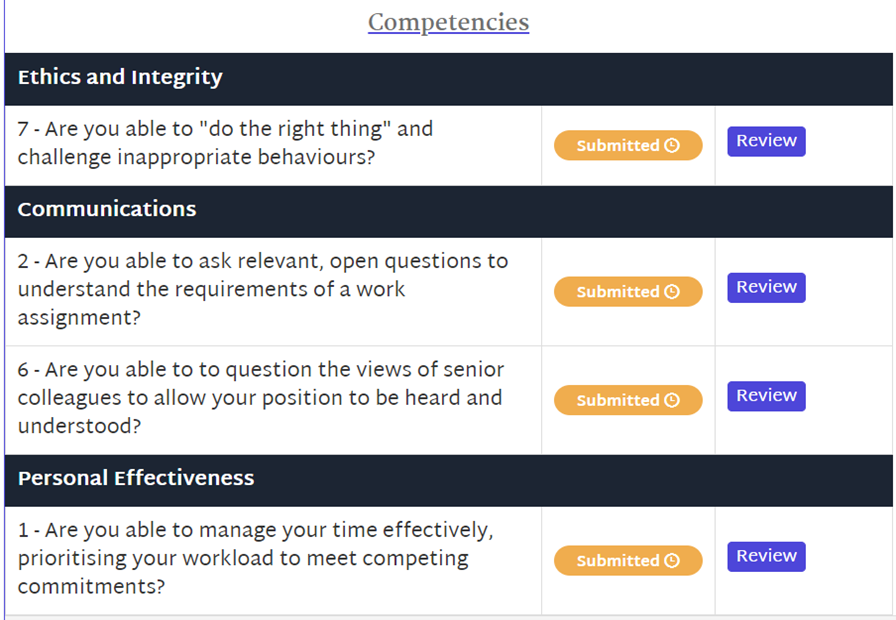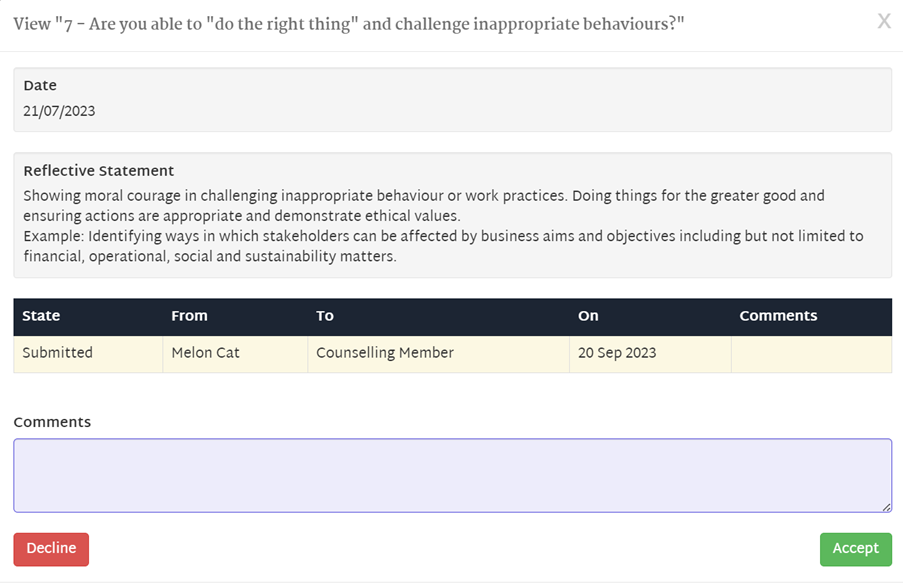An employer’s guide to the RPE logbook

Learn more about the key logbook roles, responsibilities and tasks, and how to perform them.
Relevant Practical Experience (RPE) is a key component of the CA qualification, and a compulsory requirement for students to qualify and be eligible for ICAS membership.
The logbook is where students record and evidence their RPE, time and competencies, reflecting the progress made throughout their training contract.
The student’s counselling member or reviewer is responsible for approving all RPE, time and competencies recorded in the student’s logbook.
And the student’s assigned counselling member also has responsibility for the logbook's final review and sign-off.
Understanding the key logbook roles
The counselling member, reviewer and training principal all play a direct role in supervising, mentoring and coaching students. They also play a pivotal role in monitoring practical training and helping to prepare students towards becoming qualified CAs.
- Reviewer
Doesn’t need to be a qualified accountant but must support and oversee students’ training. They’re responsible for signing-off students’ competencies and time and should regularly access students’ logbooks to review outstanding actions.
- Counselling member
Must be a qualified CA (or equivalent) with a minimum of 3-years’ post-qualification experience. They’re responsible for the logbook's final review and sign-off and can also be responsible for time and competency approval.
- Training principal
Normally an individual within the organisation who can ensure implementation of, and adherence to, the organisation’s training policy. They’re primarily responsible for the organisation of student training, ensuring it aligns with the RPE requirements and is reflected in the logbook. They may also be responsible for periodically reviewing the logbooks to ensure they’re adequate and up to date.
How to update your role
If you need to be added as a counselling member, reviewer or training principal, or for your role to be updated, please get in touch with us at firms@icas.com.
Students can manage their designated reviewer and counselling member
Students can easily view, change and manage their designated reviewer and counselling member directly from the logbook. If a reviewer and counselling member are the same person, we advise students to designate them as a counselling member only.
Understanding the key logbook responsibilities
Quality monitoring
We recommend that students take a regular, ‘little-and-often’ approach to updating their logbook over the course of their training contract. At a very minimum, they should update their logbook every 6 months.
Logbooks will be reviewed periodically on a sample basis by ICAS, with feedback and action points provided as applicable. Failure by an ATO to comply with the above areas may result in the withdrawal of ATO status.
Reminder notifications
We’ll issue email reminder notifications as follows:
- To students – in the event of no login by the student to the logbook within a one-month period.
- To reviewers / counselling members – in the event of no login by the individual within one month of a student submitting time or a competency for approval.
Academic integrity
To protect the academic integrity of the logbook and its use as evidence towards the CA qualification (and, where applicable, the Audit Qualification), ATOs are expected to remain vigilant when reviewing logbooks for potential indicators of plagiarism or misconduct and to take appropriate action or report to ICAS.
Such indicators may include, but aren’t limited to:
- Duplication of content between student logbooks.
- Evidence that suggests content has been copied from other sources, for example other students’ logbooks or commentary on performance by third parties.
- Practical experience recorded which is judged contradictory to either competencies achieved, or detail included within reflective statements.
As part of our review process, we’ll also consider any indicators of plagiarism or misconduct by a student and or reviewer, counselling member or training principal.
If we suspect or detect instances of plagiarism or misconduct, we’ll report them to the Quality and Assurance Regulations Manager (practical experience) who’ll determine if any further action is required.
Such actions may include but aren’t limited to:
- Follow-up action with the counselling member or ATO.
- Referral to the ICAS Academic Integrity and Appeals Panel.
- Referral to the ICAS Investigations Team.
We reserve the right to immediately review and, if applicable, suspend or withdraw the Authorisation Status of any ATO and or reviewer, counselling member or training principal where there’s evidence of a breach of ICAS regulations, whether deliberate or inadvertent.
Audit time
Audit time is not a requirement to qualify as a CA but is required to attain the Audit Qualification.
When a student records audit time as RPE within their logbook, they must add a supporting reflective statement of between 100 and 200 words. This allows the reviewer to confirm that this RPE has been completed. This statement must include:
- Type of engagement (please refer to the Audit Qualification guide).
- Category of audit i.e. statutory or other accepted.
- Examples of the types of audit work performed, (for example, accounts tested, auditing procedures conducted), and the student’s role within the audit team.
If a student wants any time recorded in the logbook relating to audit to be counted towards the Audit Qualification, this must be approved in conjunction with the reflective statement.
You’ll find more information on the recording and approval of audit time in our Audit Qualification guide.
Final review and sign off
The student’s counselling member is responsible for the logbook's final review and sign-off.
Whilst ICAS doesn’t conduct the final review, if a student wants to apply for the Audit Qualification, we will conduct a review to confirm that the RPE requirements have been achieved.
Logbooks will, however, be reviewed periodically on a sample basis by ICAS, with feedback and action points provided as applicable. Failure by an ATO to comply with the above areas may result in the withdrawal of ATO status.
How to perform the key logbook tasks
How to access your students' logbooks
You can access your students' logbooks here (sign in using the email and password for your icas.com account).
If you’re responsible for students at multiple offices, please select the relevant office.
If you’re only responsible for students at a single office, you’ll go directly to the homepage.
How to understand if a competency has been achieved
You should only accept a submitted competency when you know that a student can perform the task to a high standard with minimum supervision.
When completing a competency, a student is required to provide a short (50 to 200-word) reflective statement which evidences how the competency was achieved.
The statement should provide you with sufficient evidence to allow you to confirm whether the competency has been achieved to the required standard.
How to review and accept or decline competencies and time
- The homepage displays all students with outstanding actions (competencies or time submitted for review).
- Click the link to view the items requiring your attention.
- You’ll then see all the competencies submitted for review.
- Click ‘Review’ to view the student’s supporting reflective statement.
- You’ll then see the time allocations submitted for review, (please note allocations should be recorded by engagement or monthly instalments of time).
- Accept or decline the submitted competency as required. (If you decline the competency, you must also add an explanatory comment that will guide the student towards the appropriate corrective action.)
Watch our video to see how it works:
How to decline previously approved competencies or time
Competencies
To decline a previously approved competency, the student’s counselling member must email firms@icas.com and ask for the competency to be reverted to ‘submitted’ status.
The email must include the student’s full name, the competency number and the reason why it needs to be removed.
When the competency has been reverted to submitted status, the reviewer or counselling member will then be able to decline the competency, and the student will be able to amend and resubmit for approval.
Time
Students should request a time-amendment form by emailing students@icas.com.
Counselling members should request a time-amendment form by emailing firms@icas.com.
The completed from must then be returned to ICAS where it will be passed for approval to our Quality Assurance and Regulations Practical Training Manager.
How to view students without outstanding actions
- To view students without outstanding actions, click the ‘Remaining Students’ tab.
How to conduct a final review and sign-off
- The student’s counselling member is responsible for the logbook's final review and sign-off.
- The ‘Final Review’ tab will show on the homepage when you have logbooks awaiting final review.
- Click on the tab to view those logbooks.
- Click on a student’s name and you’ll see any comment the student has submitted along with the logbook.
- Click ‘Review’ to review the full logbook and see all the evidence you’ll be giving final approval for.
- The logbook will have sections covering:
- Overview
- Progress
- Reviewer/Counselling member
- Employment
- Time
- Competencies
- When ready to give final approval click on ‘Review’.
- Leave a comment in the comment box. (If you’re declining you must leave a comment.)
- Then click ‘Accept’ or ‘Decline’.
Watch our video to see how it works:
Student moving to another ATO
Students must have any Relevant Practical Experience (RPE) days and competencies submitted or approved before moving to their new ATO.
Their reviewer and counselling member will be able to review and accept or decline these after the student has moved. However, students won't be able to make any changes once they have left.
If the request is declined, the student is unable to make any amendments and therefore would have to re-submit to their new ATO's reviewer or counselling member. This is up to the discretion of the individual and a detailed comment is required to clearly evidence the reason why it was declined.
Best practice is to have everything signed off as accepted before the student moves to ensure they are able to make any amendments.
Additionally, once a student moves ATO they are unable to go back and submit or backdate any RPE to their past ATO reviewer or counselling member.
How to review student requests
On your reviewer/counselling member dashboard there will be a information box as below:

Select the 'view requests' button. This will then show a table list of the students requiring attention. Review the requests by selecting the 'review' button:

The reviewer and counselling member will then be able to review the reflective statement and date to action. If it's declined, a detailed comment must be provided, and students will then need to complete it with their new ATO.

Understanding RPE and its key role in the CA qualification
Learn more about all aspects of Relevant Practical Experience (RPE) and why it’s so important to the CA qualification.
